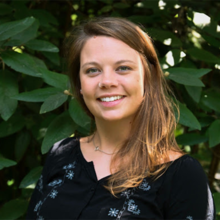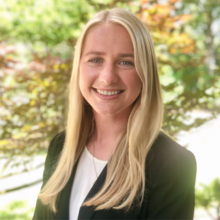Young scientists support drought monitoring in the Midwest

NCEI continues its partnership with the NASA DEVELOP Program, working with early-career scientists and university students. This nationwide program utilizes NASA Earth observations to address diverse environmental issues impacting communities. At the DEVELOP NCEI location, participants work on projects that focus primarily on climate applications and incorporate NCEI climate data. The NCEI team also partners with the National Integrated Drought Information System (NIDIS) to support drought-focused NASA DEVELOP projects each year.
This fall, the NASA DEVELOP NCEI team is working to create evapotranspiration and water balance climatologies for the Midwestern United States. These climatologies will help the region better determine the seasonal availability of water and monitor the evolution of drought conditions. The Midwest is the world’s most expansive region of corn and soybean production, and understanding the seasonal water variability of the region is vital for determining irrigation schedules, growing seasons, and general ecosystem health.
To better understand regional climate and water budget trends, the team at NCEI will work with partners representing the USDA Midwest Climate Hub, Minnesota Department of Agriculture, Michigan State University, and the NIDIS. Using Terra Moderate-Resolution Imaging Spectroradiometer (MODIS), Gridded Surface Meteorological (gridMET), and Monthly U.S. Climate Gridded (NClimGrid) observations, the team will evaluate seasonal variability and trends in the Midwest’s hydrologic cycle.
Team Members
Emma Myrick is a graduate of Appalachian State University with two bachelor’s degrees in Geology and Sustainable Development. During Myrick’s studies, she completed an undergraduate honors thesis in which she researched the role of eolian sediments in the preservation of cultural horizons on the Coastal Plain of North Carolina. Since graduating, Myrick has worked with Seramur & Associates, P.C., an environmental consulting firm, engaging in field work, analyzing data, and preparing environmental reports. This is Myrick’s second term with NASA DEVELOP, as she also worked on the summer 2021 NCEI project looking at drought monitoring techniques in Illinois.
Erica Barth-Naftilan has a PhD in Hydrology and Water Resources from Yale School of the Environment, along with a master’s of Environmental Management and a bachelor’s in Environmental Earth Sciences. Barth-Naftilan’s graduate research focused on the water quantity and quality impacts of shale gas development, where she had the opportunity to use geographic information systems (GIS) and the R statistical programming language. Barth-Naftilan looks forward to gaining experience in using remote sensing data and analysis as a first-time NASA DEVELOP participant.
Erin Shives is a graduate of San Diego State University, where she earned a bachelor’s in Interdisciplinary Sustainability Studies with a focus in Geography and Environmental Policy. During her senior year, Shives worked on a project with the City of Santee, California, measuring the impacts of Mast Park’s restoration by assessing land use and land cover changes. Her interest in the field led her to take courses specializing in advanced watershed analysis, geographic information systems, and data science. This is her second term with NASA DEVELOP, as she worked with the summer 2021 team in Boston, which looked at landslide susceptibility and flooding along the Ohio-Kentucky border.
Alec Solberg is pursuing a master’s in Geography and Environmental Studies at Northeastern Illinois University, where he also earned a bachelor’s in Earth Science. His graduate research is looking at the decision support systems for the Rio Grande region. Solberg has experience with API coding, geoprocessor scripting, and he has used satellite imagery to assess vegetation index accuracy. This is his first time in the NASA DEVELOP Program, and he looks forward to learning more about evapotranspiration.







